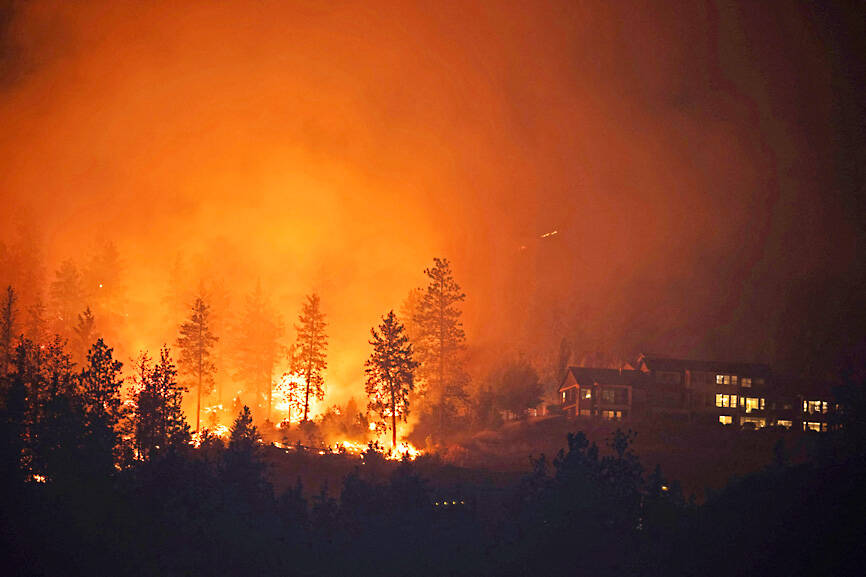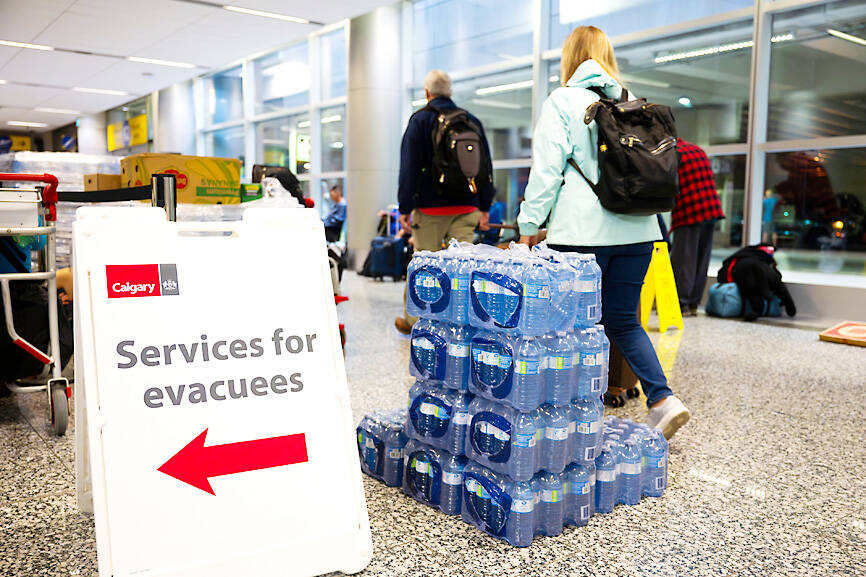Wildfires on Friday bore down on two Canadian cities, with firefighters in the west bracing for another “scary” night as stunned refugees from the far north began arriving at shelters after their entire city was evacuated.
The two fronts in British Columbia and the Northwest Territories are just the latest in a summer of devastating wildfires across the country that have forced tens of thousands from their homes and left millions of hectares scorched.
The blazes have caused “terrible loss,” Canadian Prime Minister Justin Trudeau told reporters after meeting evacuees from Yellowknife, the capital of the Northwest Territories, as they arrived in Edmonton, Alberta, hundreds of kilometers to the south with no idea when they would return home again.

Photo: Reuters
Meanwhile, British Columbia Premier David Eby declared a state of emergency in the province late on Friday.
The announcement came as the fire burning west of Kelowna, a town of 150,000 people in the Okanagan Valley, exploded a hundred fold in size to 6,800 hectares in the past day.
Officials described firefighters being forced to pull back and some becoming trapped behind lines while making “heroic efforts” to rescue residents.

Photo: AFP
“We fought hard last night to protect our community,” local fire chief Jason Brolund told a briefing. “A significant number of structures were lost,” he said, but no injuries or fatalities were reported.
“It was like 100 years of firefighting all at once, in one night,” he said, adding that he expected “another scary night tonight” under an eerie glow of the fires.
Thousands of households on Kelowna’s west side were ordered evacuated or told late on Thursday to be ready to leave at a moment’s notice.
“The situation is unpredictable right now and there are difficult days ahead,” Eby told a news conference.
In the far north, Yellowknife was a ghost town late on Friday after ordering its entire population to leave by the afternoon — the largest ever evacuation from the region.
Most of its 20,000 inhabitants left by road to the nearest evacuation center 1,150km away in Alberta, where several sites had been set up.
Almost 4,000 people flew out, officials said, with a pilot on one of the relief flights telling Canadian media that the lakeside city was “pretty empty.”
Yellowknife has not been abandoned: Crews remained to erect defenses as the flames approached, while water bombers have been seen and the Canadian military is also helping out.
Several towns and Indigenous communities had already been evacuated.
The evacuation from Yellowknife means half the population of the near-arctic territory has been displaced.

The CIA has a message for Chinese government officials worried about their place in Chinese President Xi Jinping’s (習近平) government: Come work with us. The agency released two Mandarin-language videos on social media on Thursday inviting disgruntled officials to contact the CIA. The recruitment videos posted on YouTube and X racked up more than 5 million views combined in their first day. The outreach comes as CIA Director John Ratcliffe has vowed to boost the agency’s use of intelligence from human sources and its focus on China, which has recently targeted US officials with its own espionage operations. The videos are “aimed at

STEADFAST FRIEND: The bills encourage increased Taiwan-US engagement and address China’s distortion of UN Resolution 2758 to isolate Taiwan internationally The Presidential Office yesterday thanked the US House of Representatives for unanimously passing two Taiwan-related bills highlighting its solid support for Taiwan’s democracy and global participation, and for deepening bilateral relations. One of the bills, the Taiwan Assurance Implementation Act, requires the US Department of State to periodically review its guidelines for engagement with Taiwan, and report to the US Congress on the guidelines and plans to lift self-imposed limitations on US-Taiwan engagement. The other bill is the Taiwan International Solidarity Act, which clarifies that UN Resolution 2758 does not address the issue of the representation of Taiwan or its people in

US Indo-Pacific Commander Admiral Samuel Paparo on Friday expressed concern over the rate at which China is diversifying its military exercises, the Financial Times (FT) reported on Saturday. “The rates of change on the depth and breadth of their exercises is the one non-linear effect that I’ve seen in the last year that wakes me up at night or keeps me up at night,” Paparo was quoted by FT as saying while attending the annual Sedona Forum at the McCain Institute in Arizona. Paparo also expressed concern over the speed with which China was expanding its military. While the US

SHIFT: Taiwan’s better-than-expected first-quarter GDP and signs of weakness in the US have driven global capital back to emerging markets, the central bank head said The central bank yesterday blamed market speculation for the steep rise in the local currency, and urged exporters and financial institutions to stay calm and stop panic sell-offs to avoid hurting their own profitability. The nation’s top monetary policymaker said that it would step in, if necessary, to maintain order and stability in the foreign exchange market. The remarks came as the NT dollar yesterday closed up NT$0.919 to NT$30.145 against the US dollar in Taipei trading, after rising as high as NT$29.59 in intraday trading. The local currency has surged 5.85 percent against the greenback over the past two sessions, central